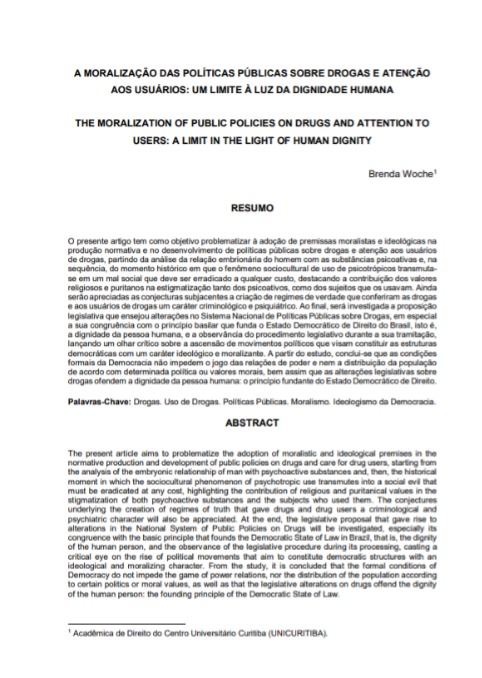A moralização das políticas públicas sobre drogas e atenção aos usuários: um limite à luz da dignidade humana
Licencia: Creative Commons (by-nc-nd)
Autor(es): Woche, Brenda
O presente artigo tem como objetivo problematizar à adoção de premissas moralistas e ideológicas na produção normativa e no desenvolvimento de políticas públicas sobre drogas e atenção aos usuários de drogas, partindo da análise da relação embrionária do homem com as substâncias psicoativas e, na sequência, do momento histórico em que o fenômeno sociocultural de uso de psicotrópicos transmutase em um mal social que deve ser erradicado a qualquer custo, destacando a contribuição dos valores religiosos e puritanos na estigmatização tanto dos psicoativos, como dos sujeitos que os usavam. Ainda serãoapreciadas as conjecturas subjacentes a criação de regimes de verdade queconferiram as drogas e aos usuários de drogas um caráter criminológico e psiquiátrico. Ao final, será investigada a proposição legislativa que ensejou alterações no Sistema Nacional de Políticas Públicas sobre Drogas, em especial a sua congruência com o princípio basilar que funda o Estado Democrático de Direito do Brasil, isto é, a dignidade da pessoa humana, e a observância do procedimento legislativo durante a sua tramitação, lançando um olhar crítico sobre a ascensão de movimentos políticos que visam constituir as estruturas democráticas com um caráter ideológico e moralizante. A partir do estudo, conclui-se que as condições formais da Democracia não impedem o jogo das relações de poder e nem a distribuição da população de acordo com determinada política ou valores morais, bem assim que as alterações legislativas sobre drogas ofendem a dignidade da pessoa humana: o princípio fundante do Estado Democrático de Direito.
The present article aims to problematize the adoption of moralistic and ideological premises in the normative production and development of public policies on drugs and care for drug users, starting from the analysis of the embryonic relationship of man with psychoactive substances and, then, the historical moment in which the sociocultural phenomenon of psychotropic use transmutes into a social evil that must be eradicated at any cost, highlighting the contribution of religious and puritanical values in the stigmatization of both psychoactive substances and the subjects who used them. The conjectures underlying the creation of regimes of truth that gave drugs and drug users a criminological and psychiatric character will also be appreciated. At the end, the legislative proposal that gave rise to alterations in the National System of Public Policies on Drugs will be investigated, especially its congruence with the basic principle that founds the Democratic State of Law in Brazil, that is, the dignity of the human person, and the observance of the legislative procedure during its processing, casting a critical eye on the rise of political movements that aim to constitute democratic structures with an ideological and moralizing character. From the study, it is concluded that the formal conditions of Democracy do not impede the game of power relations, nor the distribution of the population according to certain politics or moral values, as well as that the legislative alterations on drugs offend the dignity of the human person: the founding principle of the Democratic State of Law.
Compartir:
Una vez que el usuario haya visto al menos un documento, este fragmento será visible.


